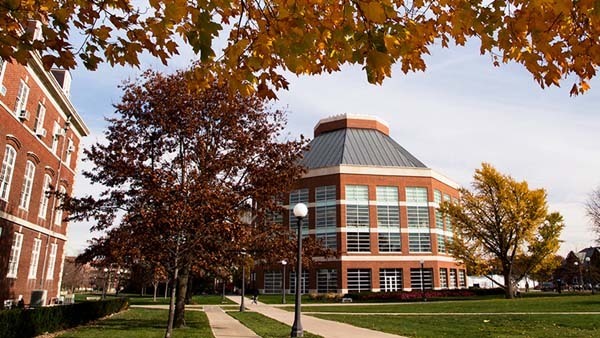Agricultural & Consumer Economics
The Department of Agricultural and Consumer Economics (ACE) in the College of Agricultural, Consumer and Environmental Sciences (ACES) applies business and economics principles to food, agriculture, renewable energy, and the environment, both here and abroad. By combining technical knowledge of the food, agribusiness, environmental and consumer sectors with expertise in management, accounting, marketing, policy, and finance, our graduates learn to make strategic and effective decisions.
Students may choose from one of nine concentrations.
Students in this concentration learn marketing and management skills and meet with industry leaders and managers. This concentration includes many hand-on opportunities for learning from seminars with visiting executives to internships.
| Do | Study marketing and management for businesses big and small. Discover factors that influence commodity prices and learn how to manage price risk through futures and options markets. Follow your food from farm to fork to understand how businesses operate along the supply chain and how consumers interact with the food system. |
| Learn | Network with industry leaders and managers. Get hands-on learning from summer internships. Travel to another country and analyze the agricultural supply chain in the International Business Immersion Program. Join ACE’s award winning National Ag Marketing Team and showcase your team’s direct marketing campaign. |
| Advance | Help feed the world with a job in marketing or management for firms producing everything from high-end foods to farm inputs. Pursue a fast-paced career at the Chicago Board of Trade. Connect producers with consumers by working with an international food retailer like Aldi or an urban farmer’s market. |
Students in this concentration discover how to apply accounting principles in financial, production, processing, or retailing sectors of the agriculture and food industry.
| Learn | Master the principles of auditing, derivatives, corporate finance, and managerial and financial accounting and learn how to apply them in production, processing, or retailing sectors of the food and agriculture industry. |
| Do | Complete a summer internship with a Fortune 500 company like John Deere, Caterpillar, Archer Daniels Midland or a public accounting firm like Deloitte or Price Waterhouse Coopers or Crowe Horwath. Join the AgAccounting Club for networking and educational events. |
| Advance | Leverage the internship experience by securing a full-time position as a corporate accountant upon graduation. Or continue your education for a one-year certified Masters of Accountancy Science program to earn the additional 24+ hours required to become a certified public accountant (CPA) and meet the minimum 150 hour requirement. |
Students in this concentration study finance as used in agribusiness, farming, financial institutions, and, more broadly, in the financial services industry.
|
Learn |
All aspects of the financial management of firms that are connected to agriculture and agribusiness, including the financial institutions and financial markets that serve the industry. Develop skills that are broadly applicable to financial services industries with specific exposure to real asset markets, insurance and investment activities, lending and credit evaluation, and management accounting. |
| Do | Have a summer internship with a bank, an agricultural lender like RaboBank, Farm Credit, or MetLife, or a company in the Research Park like Granular, Agrible, or John Deere. |
| Advance | Be a loan officer in a bank and other lending institutions. Find opportunities in investment and securities firms, firm financial management, insurance, real estate, and related fields. Discover job leads with commercial banks, private equity funds, Ag-Tech investors, the Farm Credit System, the Federal Reserve System, and the USDA’s Farm Service Agency, or develop programs with firms that finance purchases for producers such as GROWMARK and John Deere. |
Students in this concentration develop knowledge and skills to help consumers with everyday problems. Course work in consumer economics, personal finance, and economics give the student a broad-based background and understanding of the role of consumers in the marketplace.
A student can choose an emphasis in consumer economics, family economics, or financial planning and counseling.
| Learn | Develop knowledge and skills to help consumers with everyday problems. Explore consumer economics, personal finance, and behavioral economics to gain a broad understanding of the role of consumers in the marketplace. Analyze data using financial and statistical tools. |
| Do | Take advantage of internship opportunities at places like Aldi, the Federal Trade Commission, and the Illinois Attorney General’s office. Conduct independent research through course work and through independent studies with faculty members. Past topics have included credit card debt of college students and University housing policy. |
| Advance | Pursue career opportunities as an insurance underwriter, banker, financial analyst, data analyst, or consumer fraud investigator. Use knowledge of family economics working for government agencies and non-profit organizations that make consumers and families better off. Go to graduate school in applied economics, business, or law. |
Focusing on environmental and resource management issues at local, state, national, and international levels, students learn how to assess the economic aspects of resource and environmental issues and find rewarding positions in government, industry, consulting firms, and public interest groups.
| Learn | Study challenges in environmental, energy, and resource management from local water pollution to global climate change. Learn how to use economics to understand those challenges and to design effective policy and management solutions for them. Develop data science skills to analyze spatial data and quantify relationships between human well-being, policy, pollution, and resource quality. |
| Do | Conduct independent research on a topic you choose; past examples include food waste policy and the costs and benefits of recycling. Complete a summer internship at places like the Illinois Department of Natural Resources or Argonne National Lab. Join the Students for Environmental Concern and help evaluate proposals for campus sustainability. |
| Advance | Go to graduate school in environmental economics, public policy, or law. Influence policy working in legislative offices and government agencies charged with environmental and transportation policy. Help conservation and environmental advocacy groups be more effective. Promote sustainability from within industries like resource production, agribusiness, and energy. |
Students in this concentration study finance, risk management and economics as applied to management of a complex farm enterprise or ownership of rural real estate.
Students prepare to manage farms as owners, tenants, or employees; to work as professional farm managers for off-site owners; and to work in real estate appraisal, which requires state certification.
| Learn | Study the business, economics, and finance of commercial agriculture. Learn the complexities of managing a business, cost concepts, economies of scale, budgeting, financial statements, crop insurance, agricultural real estate, agricultural credit, and farmland as an investment. |
| Do | Gain valuable experiential insights about food and agribusiness through internships with leading companies. Travel and experience commercial agriculture through experiential learning opportunities domestically and abroad. |
| Advance | Shape the future of food production and engage in the business of feeding the world. Operate a farm, manage farmland for investment owners, or use these valuable skills in ag lending, crop insurance, ag real estate, grain merchandising, commodity risk management, and supply chain management. |
Students in this concentration study finance and economics as they apply to individuals, households, and small businesses in the course of accumulating and using financial resources.
Students are introduced to issues of credit management, insurance and other risk management strategies, saving and investing, retirement planning, and estate planning.
|
Learn |
Study principles of personal financial planning. Master core financial planning topic areas such as investments, tax, retirement, estate planning, higher education planning, general cash flow principles, and risk management. Learn the domains, process and ethical standards you need to become a financial planning professional. |
|
Do |
Compete in national financial planning competitions. Network at meetings of national associations such as the Financial Planning Association and the International Association of Registered Financial Consultants. Join an active financial planning club that brings professionals from a variety of backgrounds to campus for networking and educational events. |
|
Advance |
Graduate with the qualifications to sit for the Certified Financial Planner™ exam and, upon passing and meeting an experience requirement, hold the CFP® designation. Find work helping people as a CFP® professional as a wealth manager, investment advisor, insurance agent, or registered representative. |
Students receive a broad exposure to policy, international trade, and agricultural development. The concentration provides a global and societal perspective for administration, government, policy analysis, social processes, and international economics.
| Learn | Understand domestic and global challenges related to food production, development, and the environment. Learn how to use economics to evaluate policy responses to these challenges. Develop analytical skills to evaluate data and quantify relationships between policy, trade, food production, environmental outcomes, and human well-being. |
| Do | Pursue independent research on a topic in agriculture, trade, or development policy; past topics include international food security, the effect of international trade on hunger, and links between agriculture and the environment. Take part in an immersive experience studying in places like Sierra Leone, China, or Brazil. |
| Advance | Influence policymakers on agricultural, trade or international development policy. Help businesses develop their international markets. Work with international development agencies to improve the wellbeing of farmers and families in developing countries. Go to graduate school in economics, international relations, public policy, or law. |
Students in this concentration become experts in the economics of public policy in general and in its application to specific areas of interest.
This concentration will expose students to the legal and institutional structures in which policies are developed, the analysis of the economic impacts of policies, and special circumstances of public policy and law pertaining to the environment, consumers, the agricultural sector and international relations.
| Learn | Become an expert on law and public policy related to food and agriculture, environment and natural resources, consumers, and international relations. Know how to use economics to analyze and improve public policy in those realms. Understand policy development and history and how to affect change through public-interest groups, industries, and various levels of government. |
| Do | Conduct independent analyses of federal, state and local policies; past topics include food labeling, water quality, land use, and the farm bill. Travel and engage with stakeholders in Washington DC, Chicago, and internationally to gain in-person exposure to the people and places where policies are developed. |
| Advance | Design, influence and advocate for policy in legislative offices, government agencies, regulated industries and non-governmental organizations. Go to graduate school in law, public policy, or public administration. Work in law, public interest, or government. |
- ACE 100 (or ECON 102)—Introduction to Applied Microeconomics
- ECON 103—Macroeconomics Principles
- MATH 124/125—Finite Mathematics / Elementary Linear Algebra
- MATH 220—Calculus or MATH 234—Business Calculus
- ACE 210—Environmental Economics
- ACE 222—Agricultural Marketing
- ACE 240—Personal Finance Planning
- ACE 251—The World Food Economy
- ACE 262—Applied Statistical Methods and Data Analytics I
Students should consult with an academic advisor regarding course selection prior to the advanced registration period.
ACE is a great department for students interested in careers inside and outside of agriculture. With applied economics courses focused on areas ranging from international affairs to the environment, students are prepared for careers in the industries that matter to them. Our traditional business and economics courses, mixed with hands-on experiences makes ACE graduates excellent candidates for careers as Certified Financial Planners, bankers, attorneys, policy analysts and so much more.
- Analytic thinking and problem solving abilities
- Communication skills
- Completion of internships and international study/travel
- Computer literacy skills
- Critical thinking abilities
- Subject matter expertise in key areas
- Understanding and appreciating diverse cultures
- Accountant
- Agri-Business Analyst
- Agricultural Specialist
- Agricultural Statistician
- Banker
- Commodities trader
- Consultant
- Economic Development Research Specialist
- Economist
- Environmental Economist
- Extension specialist
- Farmland portfolio analyst
- Financial Planner
- Lawyer
- Loan officer
- Marketing Manager
- Merchandiser
- Professor
- Research analyst
- State conservation economist
- Supply Chain Manager
Some careers may require education beyond an undergraduate degree.
- Participating in undergraduate research
- Applying for a study abroad experience
- Utilizing resources of The Career Center
- Joining a Registered Student Organization (RSO) related to this major, such as:
- Financial Planning Club: Open to all students on campus, this club is designed to enhance the educational and professional development experiences of students interested in the field of financial planning. Financial Planning Club hosts speakers from industry, competes in case study competitions, travels to professional development conferences, and more!
- National Agri-Marketing Association: The National Agri-Marketing Association (NAMA) serves the food & fiber industry, focusing on our members' professional development by providing access to solutions and opportunities in agribusiness. Students work together to develop and pitch a product at the national marketing competition.
- Consumer Economics and Finance Club: Geared toward students in the Consumer Economics and Finance concentration in ACE, this club focuses on professional development through inviting speakers, exploring new technologies, and networking.
- Alpha Phi Omega: Our purpose as the Alpha Alpha Chapter at UIUC is to provide growth and understanding of these three principles: to develop leadership, to promote friendship, and to provide service to humanity. While all of us come from different backgrounds, we are united by our genuine love for community service and for each other. Our dedicated volunteers and comprehensive service program set us apart from all other service organizations on campus.
- Phi Alpha Delta Law Fraternity: Phi Delta Alpha is a professional organization geared toward enhancing the legal education and careers of its members.
- Illinois Trial Team: Their purpose is to provide an opportunity for students to acquire a command of trial advocacy, litigation and legal tactics, the American criminal justice system, and critical thinking skills through collegiate mock trial competitions.
- Students for Environmental Concerns: Students for Environmental ConcernS (SECS) is UIUC's oldest and largest environmental group, working with all things green on campus and around the community. Join their weekly meetings every Wednesday @ 6:30 at the University YMCA.
- Illinois Enactus: Illinois Enactus is a community of student, academic, and business leaders committed to using the power of entrepreneurial action to transform lives and shape a better, more sustainable world. The club exists to create real change through their projects while preparing members to succeed in future careers.
- Collegiate Farm Bureau: offers invaluable leadership and communication skills, including Collegiate Discussion Meet to solve real-world problems in agriculture, and invaluable, personal contacts with industry professionals.
- Minorities in Agriculture, Natural Resources and Related Sciences (MANRRS): welcomes membership of people of all racial and ethnic group participation in agricultural and related sciences careers. MANRRS attempts to provide networks to support professional development of minorities. It is a springboard for their entry into and advancement in careers where they otherwise could be lost in the sheer number and established connections of mainstream participants.
There are several professional organizations dedicated to Agricultural and Consumer Economics. Their websites might be able to provide a glimpse in the world of ACE. These organizations include:
- American Association of Family and Consumer Sciences
- Renewable Natural Resource Foundation
- The Agricultural and Applied Economics Association
- The American Institute of Certified Public Accountants
- The American Accounting Association
- The American Finance Association
- The American Society of Farm Managers and Rural Appraisers
- The Association of Environmental and Resource Economists
- Center for Certified Financial Planning
- The Illinois State Bar Association
- The Institute for Supply Management
- The International Development Association (World Bank Group)


